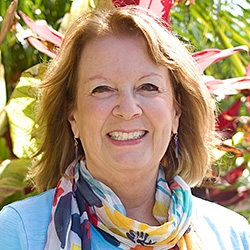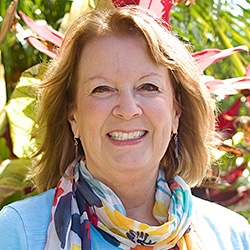
Search Results: intention
-
Inspired by a talk given by Marshall Rosenberg, Jim offers an interactive exploration of powerful strategies for making NVC an integral part of your everyday life.
-
Join CNVC Certified Trainers Jim and Jori Manske for this session that will help you minimize your reactivity and live in greater choice.
-
The focus of this 6-session class is on shifting the intention of your teaching from how to why while embodying the principles and practice of NVC every step of the way - from planning to delivery. The methodology Miki offers is to start with understanding what the people in your audience face in their environment, continue with what they might want to learn and how NVC principles can provide them with what they want, and end with how you can frame the principles in a language and context that speak to your audience’s familiar experience.
-
The focus on patriarchy emerges from the understanding that patriarchy plays a foundational role in everything. Yes, I mean it: everything. Patriarchy is not the same as sexism; patriarchy is to sexism very much what structural racism is to (interpersonal) racism: it's a system that runs independently of any one person's attitudes or behaviors. Join Miki for her first in a series of discussions on patriarchy.
-

What will it take to reclaim our fundamental relatedness with all things alive, surrender our attempts to control nature, and find a way of living that averts or mitigates the worst possible catastrophes awaiting us while it's still possible?
-
What could be, more often than not, overlooked when we think about or represent NVC or Marshall Rosenberg's work? This article busts some commonly held ideas and approaches to NVC. It challenges us to widen the lens of what it really means to be "life-serving", or speaking and hearing the "language of life". And it also speaks to how thinking can deepen feeling and relatedness...
-
For many, spending time with relatives over the holidays may be challenging. In addition to the love and care we may feel, family gatherings can bring up old hurts or expose painful differences. How many family meals have been marred by tense silence or devolved into harsh argument?
-
Ever wish you knew how you might experience more choice when you've been triggered, instead of being trapped in old habits and unmet needs? Wish you could REALLY heal old internal messages that tell you you're not good enough… not loveable… or not deserving? Join veteran CNVC Certified Trainer, Mary Mackenzie, for this 6-session course designed to deepen your ability to connect with self and heal your past through the process of Self-empathy.
-
The less blame and criticism, the easier it is for others to hear us. From this perspective, it’s in our best interest to come from curiosity and care. This way differences can bring us together and help us know one another. The more mutual understanding, the easier it is to work together and find creative solutions. Read on for more on this, with a story about how a black man inspired 200 members of the KKK to leave the organization.
-
Trainer Tip: NVC-based social change naturally emerges from “a certain kind of spirituality”, a quality of spiritual clarity. Intuitions and impulses arising from spiritual clarity are more likely to support sustainable systems. Read on for how to bring more of this in, and ways to transform your complaint into commitment.
-
Join CNVC Certified Trainer Jerry Koch-Gonzalez, Greg Rouillard and Certified Dynamic Governance (Sociocracy) Consultant John Buck for this six-session course recording to learn how to transform your method of meeting facilitation. Many NVC organizations have begun using sociocratic tools, including circle meetings and decision making by consent, with satisfying results.
-
Trainer Tip: Today, when you tell yourself that you "have to" or "should" do something, notice what you feel and experience - is it a sense of duty, obligation, guilt, shame, overwhelm, constriction, heaviness? Then consider the underlying needs you are trying to meet with the activity. This can shift the purpose and intention with an energy that motivates our actions can bring empowerment and joy to our lives.
-
Roxy Manning shares that facilitating equitable group dynamics involves tracking attention, needs, purpose alignment, resources, and impact. Identifying patterns in attention distribution, centered needs, and maintaining alignment with the purpose enhances inclusivity. Tracking internal and external resources, especially considering identity-related differences, prevents disparities. Recognizing who bears the impact, providing support, and addressing impactful issues contribute to fostering an equitable facilitation environment.
-
Using her own and participants' examples, Inbal illuminates parents on where they might be struggling with connecting to their children's needs, especially in situations where the children are responding to the parent's request.
-
Listen to this telecourse recording with CNVC Certified Trainer, Alan Seid, to explore what is meant by social change in the context of NVC, and learn how Nonviolent Communication can be a powerful ally for creating social change.
-
In this enlightening Trainer Conversation, three veteran CNVC Certified Trainers discuss whether NVC can be learned without first learning Observations, Feelings, Needs, Requests (OFNR). The conversation naturally meanders as the trainers grapple with the question, eventually covering a wide-range of topics including the spirituality and true essence of NVC.
-
CNVC Certified Trainers Jim and Jori Manske show you how to tune into the "Gratitude Channel," sharing exercises and practices to hone your awareness toward gratitude.
-
Jim leads a self-connection exercise focused on how our lives are interwoven with people we love, acquaintances, people unknown to us, and even those who have come before us or will come after us.
-
Jim and Jori discuss sharing power through exploring our experience of having and not having power, how we make choices about our power and examining our relationship to power itself.
-
How does change take place? In this brief segment, Miki explores the three key ingredients that make change possible for individuals as well as for societal change.



















